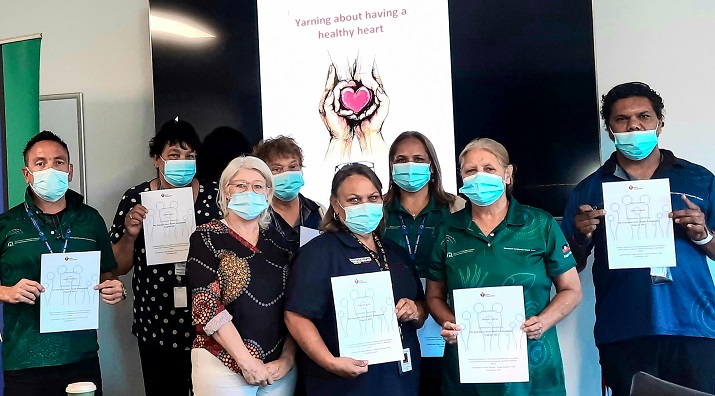Heart of the matter drives partnership
 Members of the ACHT and community advisory groups show off their training certificates with Helen McLean, Heart Foundation.
Members of the ACHT and community advisory groups show off their training certificates with Helen McLean, Heart Foundation.
The EMHS Aboriginal Community Health Team (ACHT) is collaborating with the Heart Foundation to develop a range of resources to educate Aboriginal people about heart health.
Part of the Heart Foundation’s Aboriginal Heart Health Ambassador Program, the partnership will initially release a take-home information booklet Yarning about Heart Health, which has been specifically designed to help Aboriginal patients understand the conditions that affect the heart.
For EMHS Aboriginal Community Health Project Coordinator and Lead, Ursula Swan, it was time to think outside the box.
“Our participation in the program came about when we couldn’t get our staff to attend the non-Aboriginal version of the training,” she said.
“Consequently, I had a discussion with Helen McLean, Senior Healthcare Program Officer at the Heart Foundation to run an Aboriginal version.”
The Heart Foundation launched the program in July 2021 at the request of the Department of Health, with the aim of reducing discharges against medical advice for Aboriginal patients with heart conditions.
Heart disease rates are very high within the Aboriginal community, causing one in every 10 deaths. This is also one of the major contributors to the gap in life expectancy between Aboriginal and non-Aboriginal people.
According to Helen, the Aboriginal Heart Health Ambassadors Program uses a trauma-informed approach to provide training to Aboriginal staff.
“This helps to improve their knowledge and confidence in sharing heart health information, and enabling ownership when providing culturally appropriate care,” she said.
“It has been my great pleasure to work with Ursula’s team, both the Aboriginal health liaison officers and the Aboriginal Acute Care Coordination Team.”
The first step for Ursula and her team was to create a resource that staff could use in the community to have conversations with people who have had a heart attack and educate them on how they can stay healthy.
Staff from across the health service had input in the development of the booklet, including Maureen Kelly, RPH Cardiology ward Aboriginal Health Liaison Officer, ACHT representatives Delma Balchin and Doreen Turvey, and Aboriginal Acute Care Coordination staff members Carmel Kickett, Jamie Davidson, Denise Cox and Farron Kickett.
A/Manager, Aboriginal Health, Craig Allen explained that as health practitioners providing the Aboriginal community with current clinical best practice information, it was essential to deliver this in a culturally relevant manner, reflective of Aboriginal ways of knowing and working.
“The staff from the Aboriginal Community Health Team and the Heart Foundation should be commended on their collective efforts,” he said.
“Together they have proven that creating opportunities to engage in positive, collaborative partnerships generates multiple benefits at a macro and micro level.
“Yarning about Heart Health is an excellent example of what can be created for the Aboriginal community.”
With the booklet now in the final stage of the publication process, Ursula and her team are planning the second resource – a suite of videos focusing on the heart health journeys of a Noongar man and woman.

